
For future farming
Climate change is confronting agriculture with complex and unknown challenges. Mitigation of – and adaptation to – climate change require equally new approaches. We want to support farm managers, agricultural extension services and experts in creating robust and sustainable strategies – despite uncertainty and complexity.
Decision Support
A resilient and robust agriculture requires sustainable farms. We design the farming strategies of tomorrow.
More
Education
Consultation, seminars, workshops and more. We are glad to share our ideas, knowledge and experience.
More
Projects
We are looking forward to support you in creating projects targeting climate change mitigation and adaptation.
More
MISSON
Climate change is marked by a dynamic and uncertain development. This uncertainty concerning climate change impacts on agricultural production systems is complexing climate change mitigation and adaptation processes fundamentally and is confronting farmers and other stakeholders in the food sector with a knowledge- and management-intensive new challenge.
The objective of neokultur is to prepare agriculture and its actors for these new challenges.
Our work here focuses on educating and advising decision makers along agricultural value chains in questions and methods of climate change management and robust decisionmaking
Mission
Climate change is marked by a dynamic and uncertain development. This uncertainty concerning climate change impacts on agricultural production systems is complexing climate change mitigation and adaptation processes fundamentally and is confronting farmers and other stakeholders in the food sector with a knowledge- and management-intensive new challenge.
The objective of neokultur is to prepare agriculture and its actors for these new challenges.
Our work here focuses on educating and advising decision makers along agricultural value chains in questions and methods of climate change management and robust decisionmaking.
From Farmers
-
For Farmers
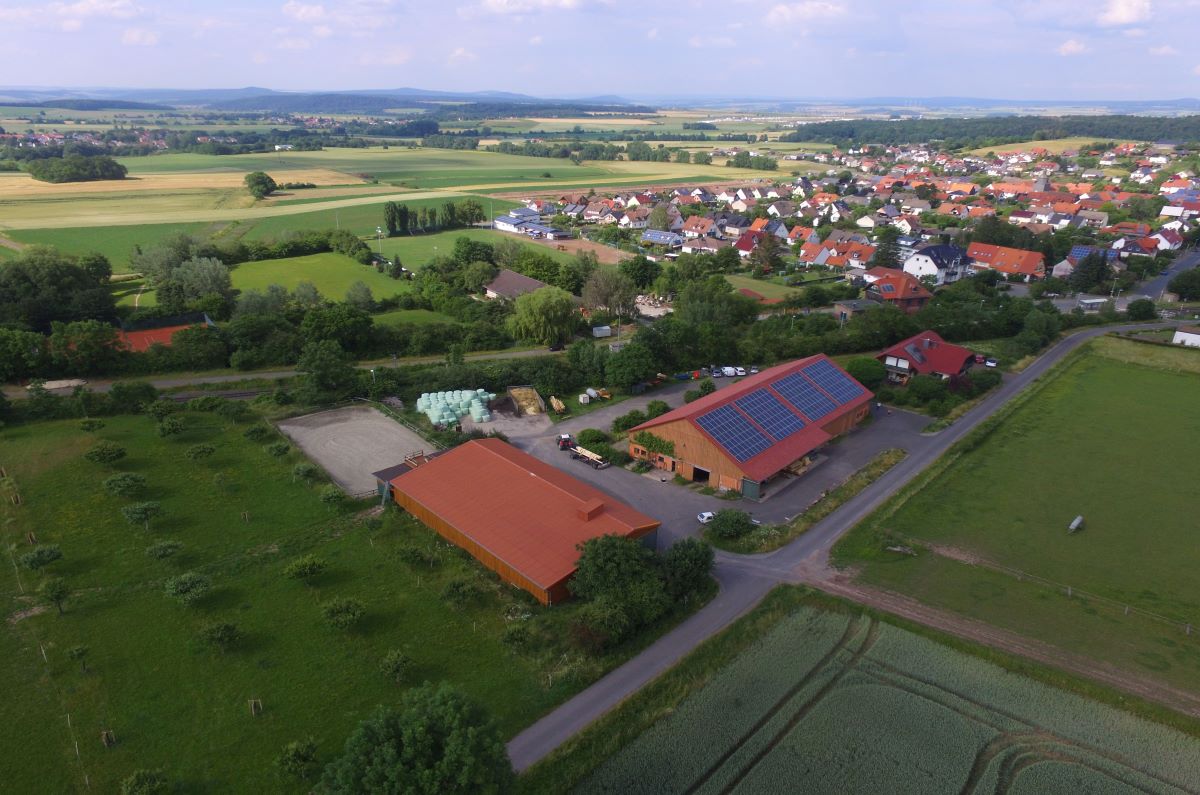
Reallabor Hof Tolle
For us, it is crucial to keep our work close to practical farming. Consequently we design, test and improve our methods and measures at the farm-level. The farm Hof Tolle serves as location and laboratory of neokultur. Since 2020, the farm is working with a farm specific climate strategy, developed with the IDAP-CC.
More
IDAP-CC
The IDAP-CC – short for “Integrated and Dynamic Agricultural Planning for Climate Change” is the product of a research work at the University of Hohenheim. It is a new planning and management approach for farms, able to deal with uncertainty and complexity as consequences of climate change.
More
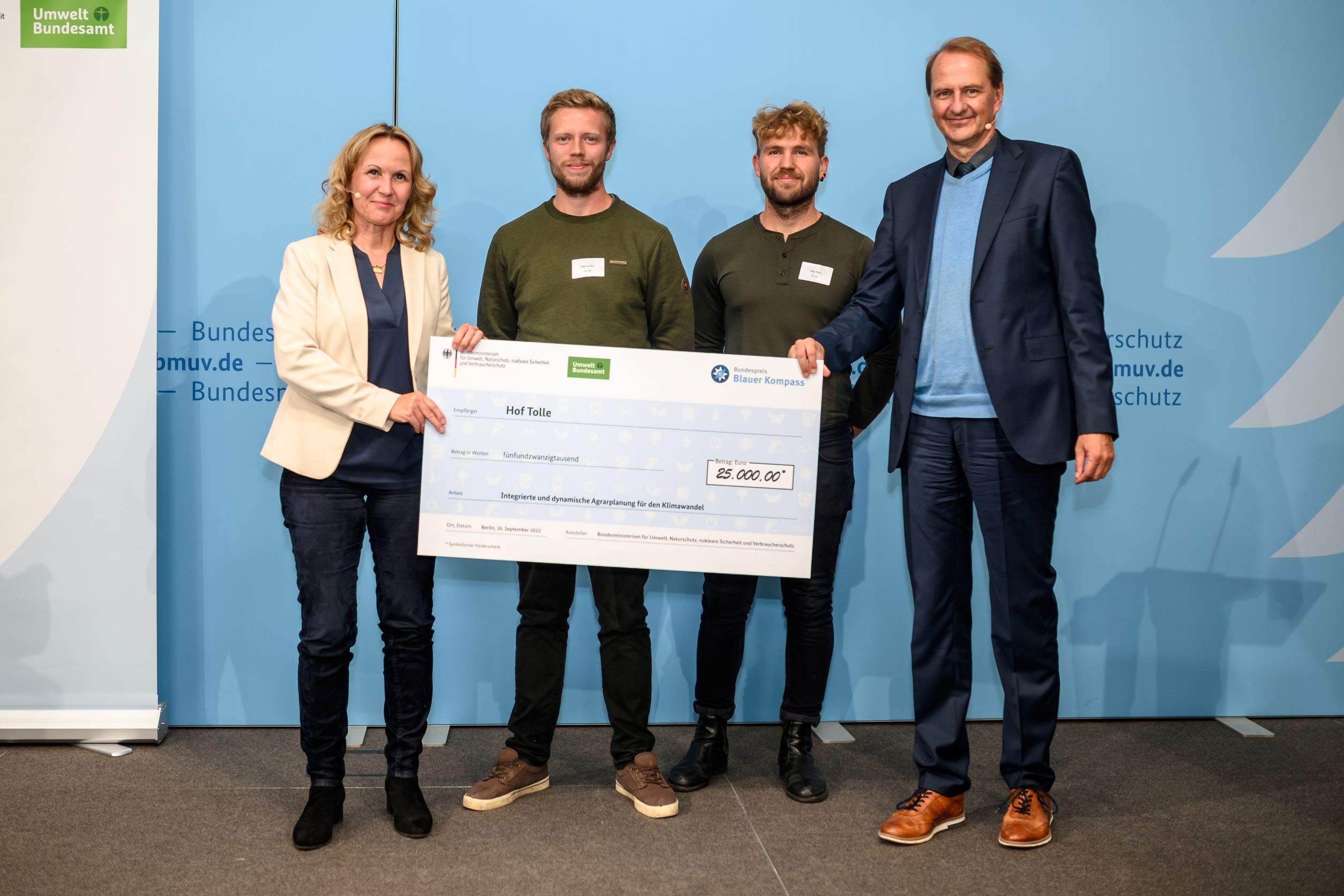
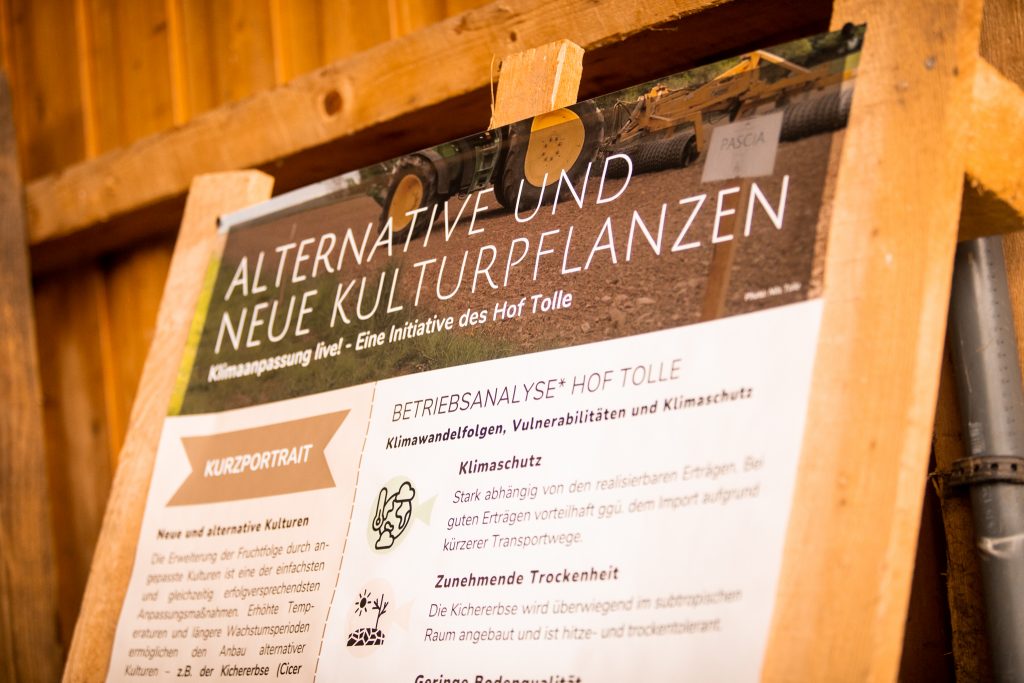
transfer
We are eager to share our expirience and knowledge concerning climate change and agriculture. Alongside ongoing projects, presentations, workshops and our climate farm fest, we are open to new ideas.
more
Award winner Blauer Kompass 2022
You have ideas, questions or impulses concerning our work?
What it is about
Climate change and agriculture
Agricultural systems are complex and per se difficult to organise since diverse bio-physical and socio-economic factors interact. This complexity is further aggravated by the influence of climate change.
The main challenge is the uncertain and dynamic nature of climate change. We simply do not know when and where which impacts will occur with which intensity – and how this will alter the interaction of the different factors constituting the farming environment. Especially the spatial and temporal specific impacts – crucial for the individual farm – are marked by uncertainty. This uncertainty is hampering the planning and implementation of successful adaptation measures. Beside the risk for ineffective measures, uncertainty is increasing the risk of maladaptation. This means that implemented adaptation measures can have negative side-effects or even compromise long-term adaptive capacity of a farm. The management of uncertainty and complexity make new approaches in farm planning and management necessary.
Beside uncertainty, the unique nature of every single farm is complicating adaptation. Due to a heterogenous structure, generally applicable solutions and advice are not possible. Structure, values and motivations of the individual farm and farmer must be integrated in order to design robust and sustainable farm climate strategies.
IDAP-CC
The IDAP-CC was developed to enable farmers to plan and implement climate change mitigation and adaptation measures – despite uncertainty and complexity. IDAP-CC is short for Integrated and Dynamic Agricultural Planning for Climate Change, which is an innovative decision-support tool in the shape of a comprehensive planning framework. This framework is able to support the design of farm-specific and robust farm climate strategies. In the IDAP-CC, uncertainty is incorporated in the planning process in an ex ante approach in order to reduce the risk of maladaptation. In order to ensure a farm climate strategy is in line with the ideas, values and motivations of the farmer, the IDAP-CC is following a participatory approach. This means all planning and strategy formulation is done in collaboration with the farm stakeholders, which also entails a core learning process. Because successful adaptation starts in the mind.
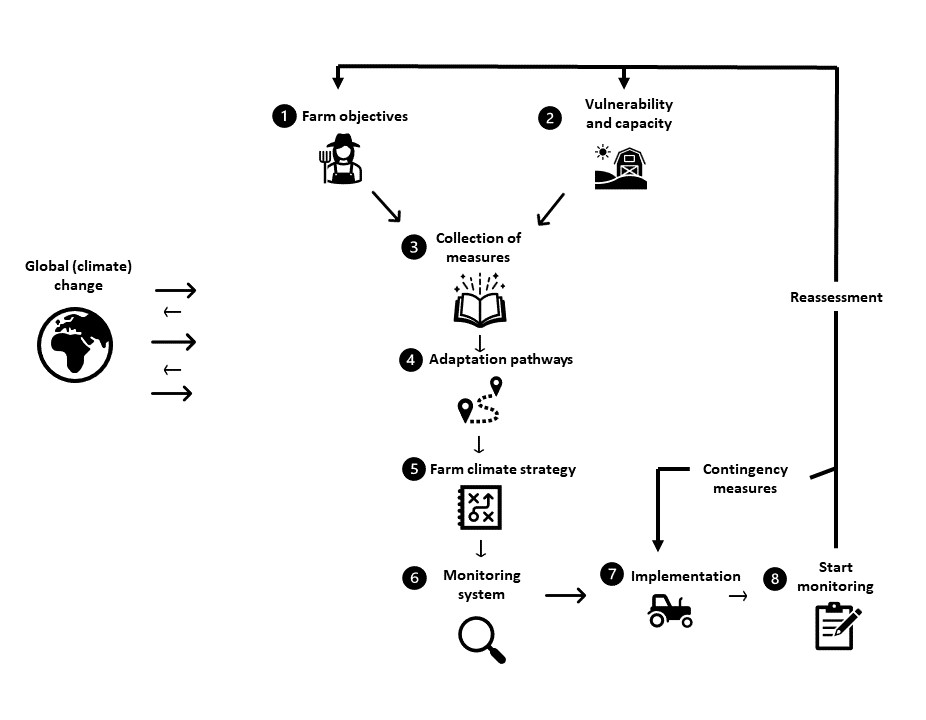
The eight steps of the IDAP-CC framework in simplistic visualisation
The IDAP-CC is based on adaptation sciences and farm management sciences and combines approaches from Decisionmaking Under Deep Uncertainty and Farm Strategic Planning. In contrast to traditional risk management practices, the IDAP-CC is not based on probalistic expectations about the future (predict-than-act) but is based on the idea of adaptation as a constant and flexible process (prepare-and-adapt). This approach is not ignoring complexity, but proactively incorporating it in the planning process of farm-level adaptation.
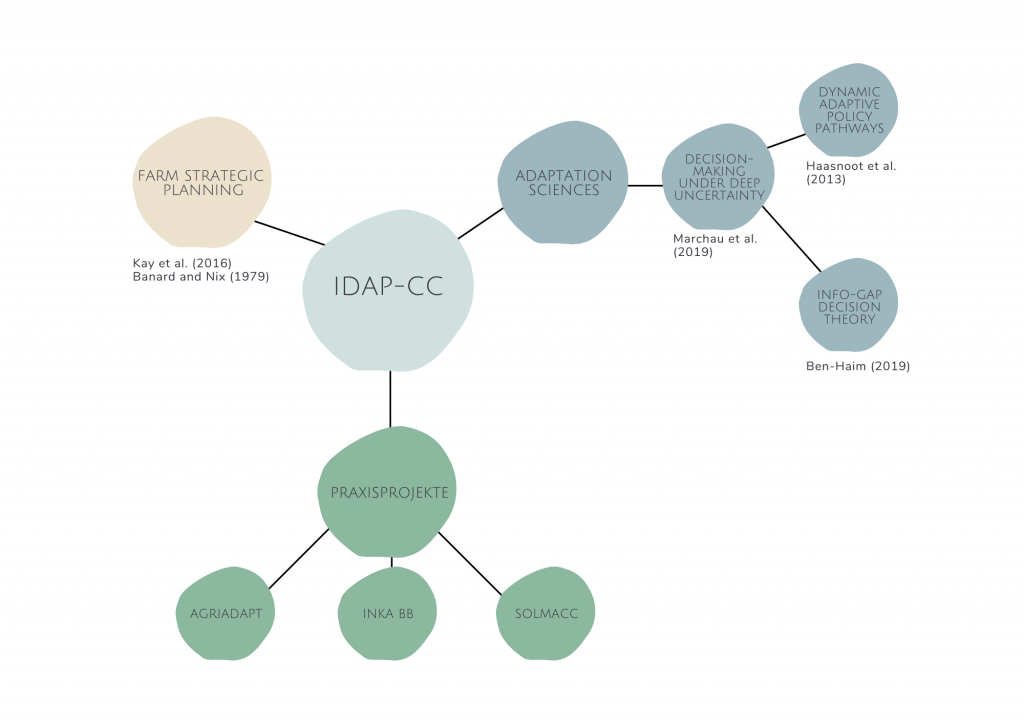
Schematic figure of the different approaches and methods constituting the IDAP-CC (not comprehensive)
Service
neokultur is an independent company which focuses on decision-support and strategy development in the context of climate change and agriculture. We combine a interdisciplinary training in the specialized fields climate change and ad adaptation sciences with professional agricultural experience. This combination enables us to transfer theoretical methods into practical application and consequently the development of innovative approaches to tackle climate change mitigation and adaptation. This is not only relevant for farm managers, but also for extension services, researchers and other stakeholder in agricultural value chains.
Training
The complex climate change and agriculture is knowledge-intensive and mitigation and adaptation strategies must be designed in a sophisticated manner. Stakeholders in agriculture must learn to work with complexity and uncertainty. Our methods can support the process.
Knowledge transfer
In order to work sustainably, it is not sufficient to implement new ideas successfully. It is necessary to spread one’s ideas and knowledge and teach other actors. We are eager to share our experiences and methods with fellow farmers, researchers and the interested public – in the lecture hall and on the field.
Demonstrations
Our goal is to make farms climate proof – in theory and practice. Consequently, we are testing several different mitigation and adaptation measures on field and farm. On our farm Hof Tolle we can display and explain various approaches to farm in a changing climate – visit us and see our successes, failures and ideas live on the field.
Portfolio
Decision-Support
How can we design successful adaptation in a proactive manner – despite uncertainty and complexity? How can decision-support methods be integrated in existing structures?
Adaptation
How to measure successful adaptation? How can the risk of maladaptation be reduced directly in the planning process of climate change adaptation?
Vulnerability
What is contextual vulnerability? How to analyse impact-based vulnerability? How can the insights from vulnerability analysis help us in designing farm climate strategies?
Strategy Development
How to select and combine mitigation and adaptation measures in a farm-specific context? Which measures correspond with the individual farm and its structures?
Dynamics
How can adaptation be designed in order to correspond with the dynamic and uncertain nature of climate change? How can success and failure be monitored?
System Thinking
How can the synergies between different mitigation and adaptation measures be increased? How can trade-offs be reduced? How can farm planning address systemic risk?
This is a section of the question we tackle with our work and our methods. Feel free to contact us in order to evaluate whether we can support your specific idea, project or other request.
Projects
Reallabor Hof Tolle
As most things we do, the idea of neokultur was born from agricultural practice. The Hof Tolle was concerned about the development of climate change and how it will impact the world in general and their farm specifically. Especially the Uncertainty about the extent and the direction of climatic change impeded the planning and implementation of tangible adaptation and the development of a robust farm development strategy. But guidance about how to handle climate change, uncertainty and associated risks at farm-level were simply not existing.
Based on this need, a research project in cooperation with the University of Hohenheim was conducted. In the course of this study, an innovative decision-support tool (the IDAP-CC) was developed and practically applied to the farm. The declared goal was to sustainably re-design the Hof Tolle and its practices and to develop a flexible and dynamic farm climate strategy which corresponds with the challenges of an accelerating climate change.
But not only the Hof Tolle was struggling with climate change and uncertainty. Many farms, companies and institutions along the agricultural value chain are aware of the complex and urgent challenges of climate impacts. Swiftly, the demand for academic and practical exchange on all levels increased. At this point, neokultur and its mission was born:
Design successful and sustainable climate mitigation and adaptation strategies in agricultural, land-use and
nutrition contexts. From the food-system at large to the smallest farms.
Farm Climate STrategy
A farm climate strategy combines different mitigation and adaptation measures over the course of time. This strategy is the product of a participatory decision support process, based on the IDAP-CC. Since the farm climate strategy and the IDAP-CC are designed dynamically, the current illustration of the farm climate strategy of the Hof Tolle is merely a snapshot and is subject to change – depending on how climate change, the farm and the world around it will change.
Below, you can find an excerpt of the farm climate strategy of the Hof Tolle, which is not comprising all mitigation and adaptation measures. Not displayed here, but equally important outcomes of the IDAP-CC process are changes in farm management and organisation.
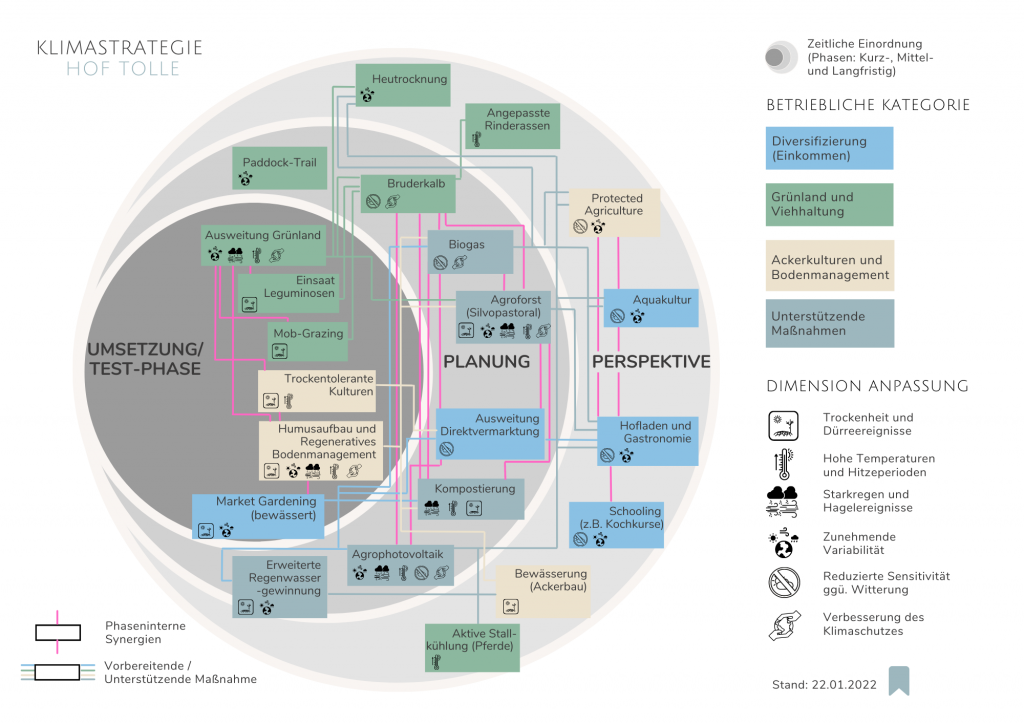
Implementation- and Testing Stage
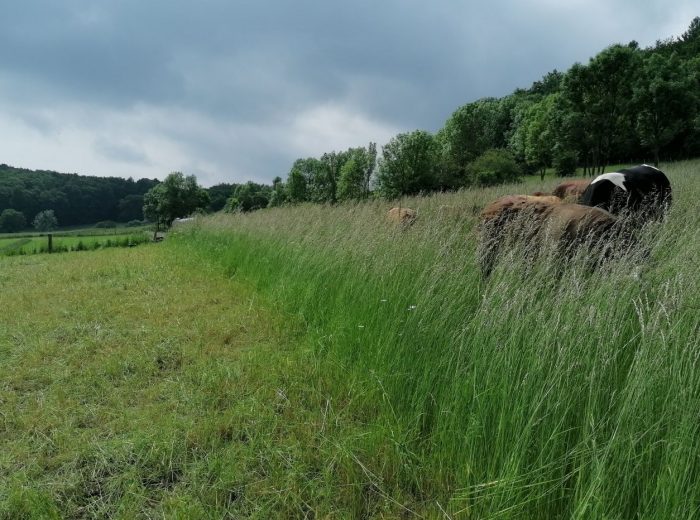
Mob-Grazing
Alternative pasture management system from arid zones
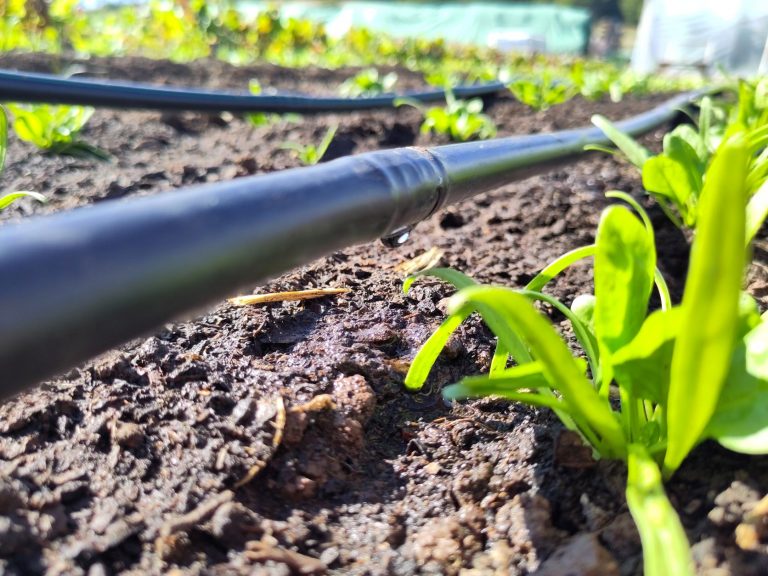
Market Gardening
Bio-intensive cultivation methods for vegetables – irrigated
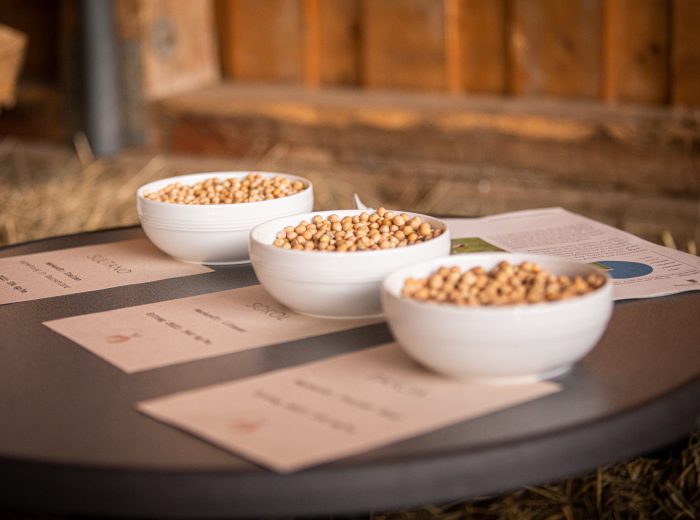
Alternative Crops
Testing new and alternative crops which are better adapted to dry-warm conditions
Planning Stage
Agroforestry | Silvopastoral System
Further income diversification and several additional side-effects (natural weather protection for animals, soil improvement, etc.)
Agriphotovoltaic
Energy independency, dynamic protection for vegetable production (e.g. against heavy precipitation events)
Compost Production
Main input for Market Gardening, soil improvement measure for arable soils
Outlook Stage
Protected Agriculture
e.g. Glasshouse production of vegetables
Further Diversification
e.g. farm gastronomy
Heat-adapted Cattle Breeds
e.g. crossbreeding with Zebu breeds